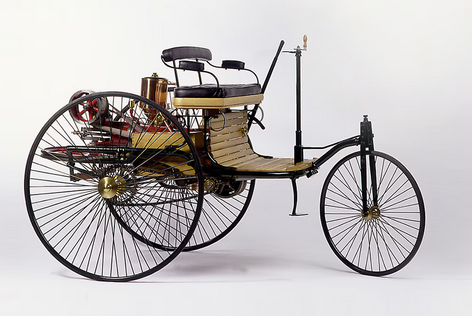The Wheels of Progress: Creation of the Automobile
- thebinge8
- Sep 17, 2024
- 3 min read

In the annals of human ingenuity, few inventions have had as profound an impact on society as the humble automobile. What started as the fanciful musings of a deranged German tinkerer has blossomed into a global industry that shapes the way we live, work, and play. And the best part? The story of the automobile's birth is an absolute riot, peppered with historical nuggets that would make even the hardened gearhead chuckle.
It all began in 1886, when Karl Benz, a man who should have been committed to an asylum rather than allowed to tinker with dangerous machinery, unveiled his "Motorwagen" - a three-wheeled monstrosity that looked like it was designed by a toddler high on pixie sticks. Benz's Motorwagen was the first gasoline-powered automobile, but it had a top speed of just 10 mph. Clearly, the early automotive pioneers were more concerned with making things move than making them move quickly.
Benz, it seems, had the mechanical aptitude of a tree sloth and the foresight of a goldfish, as he earnestly believed this clunky contraption would one day replace the trusty horse-and-buggy. Of course, the initial public reaction was about as enthusiastic as a child being forced to eat their vegetables. People looked at Benz's creation and collectively thought, "Yeah, no thanks. I'll stick with the horse that doesn't need to be cranked like a music box to get moving." But Benz, undeterred by logic or common sense, pushed on, determined to force his bizarre vision upon the world.
It took several years for the public to warm up to the idea of a self-powered carriage. In fact, the first customer didn't purchase one of Benz's Motorwagens until 1888, when he finally added a fourth wheel to make the thing a bit more stable.
Fast forward a few decades, and suddenly the automobile started to gain traction (pun intended). Henry Ford, a man with a legendary dislike of windshield wipers and turn signals, decided to mass-produce these mechanical monstrosities, making them affordable for the average person. Ford's iconic Model T, introduced in 1908, cost just $825 (equivalent to about $23,000 today). This made it affordable for the growing American middle class and helped cement the automobile's place as a household item rather than a rich person's toy.
What could possibly go wrong? Well, as it turns out, quite a lot. The early days of the automobile were rife with peril, from spontaneous engine fires to brakes that worked about as well as a chocolate teapot. Drivers would often find themselves careening down the road, white-knuckled and terrified, as their vehicles threatened to tear themselves apart at the seams. In the early 1900s, many cars had no brakes at all, relying instead on a "foot-operated parking brake" that was about as effective as trying to stop a runaway train with a piece of string. It's a wonder more people didn't end up as hood ornaments back then.
And let's not forget the cultural upheaval the automobile caused. Suddenly, people could travel farther and faster than ever before, which meant they could also get into way more trouble. Speeding, road rage, and the dreaded "backseat driver" all became part of the automotive experience, much to the chagrin of the easily-perturbed masses. The first speeding ticket was issued in 1902 to a motorist traveling at the breakneck speed of 12 mph. Clearly, the authorities of the time were a bit trigger-happy when it came to enforcing the law.
But through it all, the automobile persevered, evolving from a rickety deathtrap into a sleek, technologically-advanced marvel. Today, we take for granted the fact that we can hop in a car and travel hundreds of miles without the aid of a team of horses and a strong pair of legs. We've come a long way since the days of Benz and his three-wheeled monstrosity.
So, the next time you're cruising down the highway, blasting your favorite tunes and enjoying the wind in your hair, take a moment to appreciate the sheer lunacy that brought us to this point. The automobile may be a technological triumph, but its origins are firmly rooted in the kind of madness that would make even the most seasoned psychiatrist reach for a bottle of aspirin
Comments